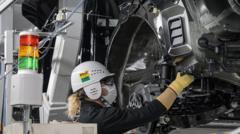As the automotive industry transitions towards electric vehicles, Honda and Nissan have initiated discussions about a potential merger. This move comes amidst increasing competition, particularly from rapidly growing Chinese manufacturers, and follows their prior agreement to explore collaboration in EVs. Challenges remain, including political scrutiny and existing alliances.
Honda and Nissan Consider Merger Talks to Boost EV Competitiveness

Honda and Nissan Consider Merger Talks to Boost EV Competitiveness
Japanese automakers Honda and Nissan engage in exploratory talks for a potential merger, aiming to strengthen their electric vehicle market position against rising competition.
In a significant industry development, Honda and Nissan have reportedly embarked on exploratory talks concerning a potential merger, which would strategically position them to better compete against electric vehicle (EV) manufacturers, especially in the competitive Chinese market. This conversation unfolded after both companies agreed in March to assess a strategic partnership focused on electric vehicles.
In response to inquiries, both corporations issued nearly identical statements, affirming, "As announced in March of this year, Honda and Nissan are exploring various possibilities for future collaboration, leveraging each other's strengths." While the discussions are at a nascent stage and no definitive deal is assured, the firms have yet to dismiss the claims that originated from the Japanese business publication, Nikkei. They further noted that "this is not something that has been announced by either company."
Anticipation builds as Japanese television station TBS reported early next week might bring an official confirmation regarding the talks. Meanwhile, Nissan rebuffed a Bloomberg report that it had been approached by Foxconn concerning a potential controlling stake in the company, with Foxconn remaining silent on the matter.
A merger between these significant automotive entities presents several complexities, including the looming threat of political scrutiny in Japan and potential workforce reductions. Nissan also faces the challenge of transitioning away from its established partnership with French automaker Renault.
Following their initial promise to collaborate in the EV sector in March, Honda and Nissan expanded their partnership in August, focusing on advancements in battery technology and other automotive innovations. They also initiated discussions with Mitsubishi Motors about electric vehicle intelligence and electrification.
The Nikkei hinted at a possible future inclusion of Mitsubishi in any extensive partnership, given that Nissan is the largest stakeholder in Mitsubishi. On the Tokyo Stock Exchange, Nissan's shares saw a remarkable increase of 23% on Wednesday, contrasting with a decline of around 3% for Honda, while Mitsubishi shares surged nearly 20%.
According to automotive market analyst Jessica Caldwell from Edmunds, the survival of lesser-known manufacturers is becoming increasingly difficult due to fierce competition, especially from Chinese brands like BYD, which recently surpassed Tesla in quarterly revenue for the first time in October. Caldwell emphasized the need for consolidation in the market not just for survival, but to financially sustain future innovation.
However, skeptics like Jesper Koll from Monex Group expressed doubt about the potential merger's efficacy, questioning whether it could enhance the competitiveness of both firms. He likened the merger attempt to “rearranging the deck chairs on the Titanic,” suggesting that neither company has compelling products or technologies appealing to global consumers.
As the automotive landscape rapidly evolves, questions remain about how effectively Honda and Nissan can navigate these turbulent waters and whether their potential consolidation will foster a stronger presence in the electric vehicle sector.





















